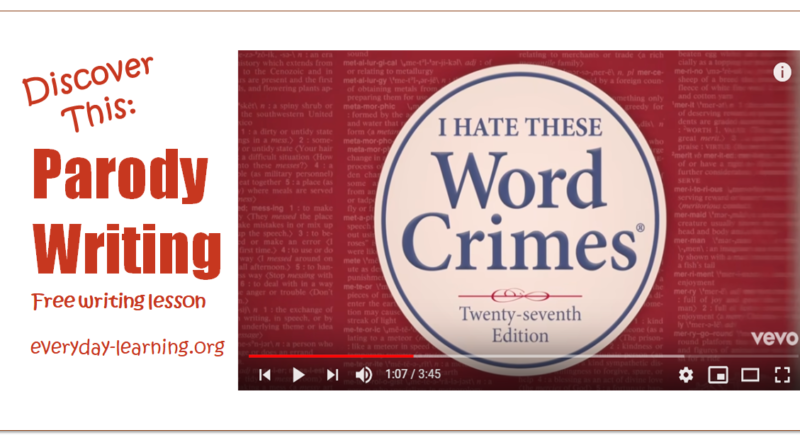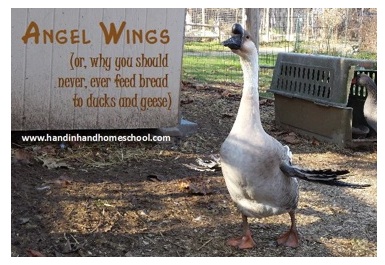Discover This: Parody
Last week, LitHub’s Jessie Gaynor posted a fun piece on rewriting the opening lines to 10 classic novels, reflecting social distancing. It was a light-hearted post meant to encourage people to stay home and flatten the curve of COVID19.
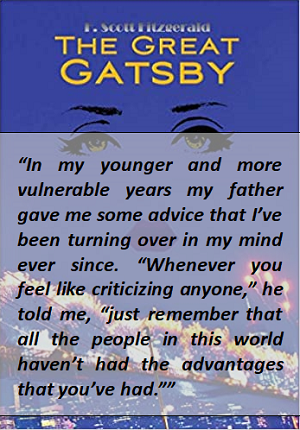
Gaynor’s rewrite for F. Scott Fitzgerald’s The Great Gatsby was subtle but apropos:
“In my younger and more vulnerable years my father gave me some advice that I’ve been turning over in my mind ever since. ‘Whenever you feel like going to a restaurant,’ he told me, ‘just remember there are people in this world whose immune systems haven’t had all the advantages yours has had.‘”
Her rewrite of the opening line of Herman Melville’s Moby Dick was much simpler. Gaynor took “Call me Ishmael” and came up with “FaceTime me, Ishmael.“
I thought of my own all-time favorite opening line, written by Franz Kafka in his short story Metamorphosis. Without much effort, I came up with:
“When Gregor Samsa woke up one morning from unsettling dreams, he found himself changed in his bed, alone and distant from the monstrous virus.”
Now that some states are in full lockdown mode and schools across the country may be closed for the rest of the academic year, Gaynor’s tongue-in-cheek post presents an excellent #HomeschoolThis opportunity. It’s an easy language arts lesson that requires no preparation. All you’ll need is some paper and pencil and a few of your favorite books from your bookshelf. Don’t have the books? Search for the book on Amazon and click on the Look Inside tab to read the first sentence.
Why Parodies
Parodies imitate books, poems, songs, movies, and even art in a purposefully exaggerated form. Parodies make people laugh. Some parodies also try to send a learning message. Both goals are super important right now during this global pandemic.
Weird Al Yankovich is probably one of the most well-known parodiest known, rewriting lyrics of famous songs. What makes Weird Al so much fun is that his parodies pay close attention to syllable count and rhyming patterns. He also blends just enough of the original words, that you’ll be expecting to hear the real song but instead you wind up OMG-ing at his clever word play.
Writing Parodies
Both emerging writers and your most reluctant writer can enjoy coming up with parodies with the proper support. All it takes is modeling the brainstorming process together – and not getting hung up on actually writing the words down. Let me show you.
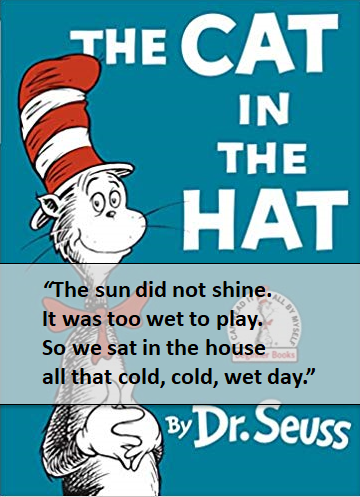
Start with a story that your kiddo knows well. Read over the first sentence together – or, in the case of Dr. Seuss’ The Cat In The Hat, read over the first set of sentences.
Working with opening lines that rhyme is actually a little more difficult. With rhyming books, you’ll need to figure out the rhyme scheme. Listen to the last word in each line. Which lines rhyme and which ones don’t? You’ll also want to count the syllables in each line.
Next, take a look at the sentence content. Do you see a pattern? With The Cat In The Hat opening lines, the sentences are cause and effect. The first 2 sentences tell us basic facts. The 3rd sentence is the resulting effect.
[Do you really want to get into all this sentence analyzing detail with little kids? No – but it’s helpful for you to know so you can keep the activity from getting frustrating.]
Now the brainstorming part begins. Since your parody will be about the coronavirus, think of all the keywords that relate to COVID19 and staying inside. Be sure to include a list of words that rhyme for lines 2 and 4. Stuck on rhyming words? Check out a free online rhyming dictionaries.
Online Rhyming Dictionaries
Finally, the fun part! Play around with different parody lines. When opening lines rhyme, you’ll also need to check if you have the correct number of syllable counts in each line. You don’t have to be exact, but being more than 1 or 2 beats off will cause your parody to lose its cadence.
I kept my Cat In The Hat parody simple. What did you come up with?
| Line | Rhyme | Syllable Count | Parody Line |
| 1 | A | 5 | The virus was here. |
| 2 | B | 6 | We were looking to play. |
| 3 | C | 6 | As we sat in the house |
| 4 | B | 5 | Just day after day. |
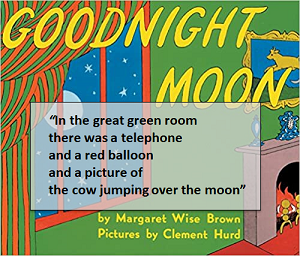
Try another rhyming opening line parody rewrite.with Margaret Wise Brown’s Goodnight Moon.
My rewrite took the liberty of making lines 2 and 3 rhyming lines. I feel kind of meh about it. I bet your teenager can do better.
In the great green room
There was a mask,
An isolation task,
And a bottle of lysol
Inspiring a sense of doom.
Your Turn
I put together a list of 16 opening lines that your kids can play around with. There’s everything from pictures books to chapter books to Shakespeare. Do as many parody rewrites as your kids enjoy.
You can also extend this activity. When you rewrite an opening line, you change the premise of the story. Have your child give you a short synopsis of how the ending will change. To do this, you’ll want to take a few minutes to first review the main parts of the story and important characters.
Learning Value
I classify this activity as a writing lesson, but I encourage you to not get hung up on spelling. For that matter, ditch the actual act of writing out words if your kiddo hates to write. Instead, let them dictate their opening lines to you OR use the speech to text option on your phone.
This parody writing activity focuses on the skills of:
[1] analyzing text;
[2] brainstorming;
[3] thinking creatively;
[4] summarizing (if you do the extension activity); and
[5] practicing positive thinking.
In a very literal way, kids have the opportunity to see how they can rewrite a perspective and change the course of a story. This becomes a valuable lesson during the coronavirus pandemic – especially on the days when we may feel helpless.
Remember, there’s no right or wrong answer to this activity. Just like all humor, some rewrites will be funnier than others and that’s okay. If your child is proud of their rewrite, then giggle along with them.

